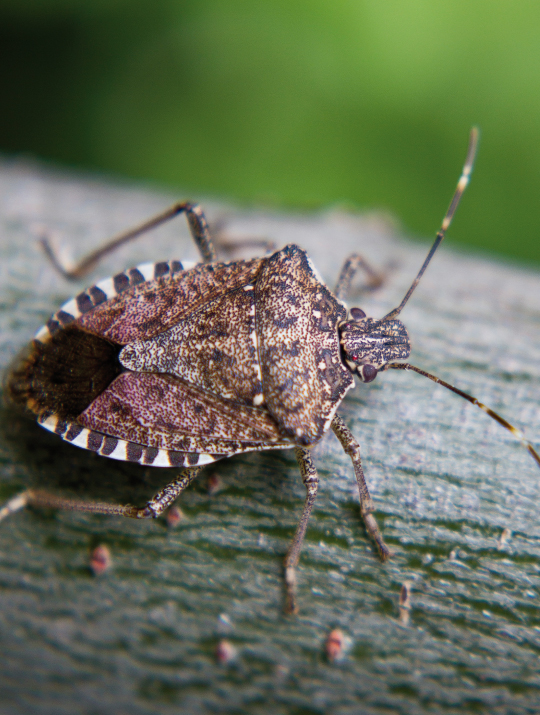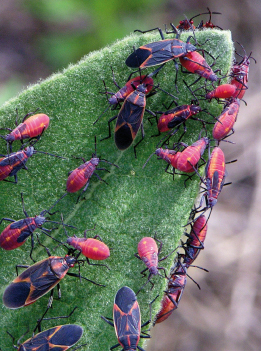Overwintering House Pests: How to Send Stink Bugs, Ladybugs, and Boxelder Bugs Packing

 Many events mark the transition from summer to fall in the Roanoke Valley: the striking color change of the trees, the numerous autumn festivals and, unfortunately for us, the annual migration of pests moving into our homes to settle in for the winter. Among the most common of these pests are the stink bug (brown marmorated stink bug), the ladybug (multicolored Asian lady beetle), and the box elder bug. What’s surprising about these insects is that none of them are actually native to Virginia!
Many events mark the transition from summer to fall in the Roanoke Valley: the striking color change of the trees, the numerous autumn festivals and, unfortunately for us, the annual migration of pests moving into our homes to settle in for the winter. Among the most common of these pests are the stink bug (brown marmorated stink bug), the ladybug (multicolored Asian lady beetle), and the box elder bug. What’s surprising about these insects is that none of them are actually native to Virginia!
The stink bug is the newcomer to our area. Native to eastern Asia, it was first found in Pennsylvania in 1996, likely traveling over by boat or plane. This species is a great hitchhiker; by 2004 it was found all over our region and today it can be found in all 48 contiguous states. These pests pose a threat to many fruit-bearing trees, vegetables and soybeans.
Ladybugs are generally considered highly beneficial from an agricultural standpoint because they eat aphids and mites. The multicolored Asian lady beetle is also an eastern Asia native and was purposely introduced to areas of the US throughout the 1900s to protect crops. In the last few decades, Virginia has seen a large increase in ladybugs that have left their homes in the country to overwinter in our homes in the city.
 The boxelder bug, though less well known, is a problematic pest for many area households. This species, identified by the reddish bands along its sides, is native to western states but has found its way to the eastern US and parts of Canada. Named for the harm it causes to boxelder trees, the boxelder bug also poses a threat to other related trees such as maples.
The boxelder bug, though less well known, is a problematic pest for many area households. This species, identified by the reddish bands along its sides, is native to western states but has found its way to the eastern US and parts of Canada. Named for the harm it causes to boxelder trees, the boxelder bug also poses a threat to other related trees such as maples.
Besides being a nuisance when overwintering in our space, all three of these pests can leave nasty stains on walls and carpets; and in the case of the stink bug and ladybug, they can produce foul-smelling toxins. Therefore, their removal from your home is advisable.
Why Choose Our Homes?
So why do these pesky insects choose to bed down in our houses for the winter? According to Dr. Eric Smith of Dodson Brothers Exterminating Company, our homes mimic the warm caves where these insects would overwinter in their natural habitats. They seek the warmth that modern buildings provide as well as the dark areas between walls and siding. Pests will most often be found on the southern walls of homes, sometimes in combination with the adjoining eastern and western walls, pursuing the heat. In addition to this, the same generations of insect will return to the same shelter year after year. This explains why one house on a street might have a horrible pest problem when neighboring homes do not. The overwintering process can begin as early as mid-August for some insects and typically reaches its peak in September or October.
 Removal and Prevention
Removal and Prevention
You can stop the pushy pests from moving in for the winter by sealing them out before they have a chance to get cozy. Your first task is to remove any visible insects or their remains with a vacuum cleaner. You might consider dedicating an inexpensive vacuum cleaner for bug removal as both stink bugs and ladybugs release smelly toxins inside the hose and vacuum bag, making it unpleasant to use in your regular household tasks.
Next, use a flexible caulk for sealing small crevices and use an expandable foam product for the larger ones. Areas to consider include: door frames, window frames, door thresholds, light fixtures, ceiling fans, heating ducts, electrical outlets, and switch boxes. These areas are considered fully sealed when no light can escape from the cracks. Even larger gaps that can’t be sealed, such as vents, should be covered with 16-mesh screening.
Prevention truly is the best line of defense against these bugs because using insecticides, pesticides and chemicals will generally only kill the pests on contact. “Bug bombing” an entire home or room is a bad idea as this will leave many dead bugs inside your walls which will then lead to another problem: the larvae of dermestid beetles (also known as carpet beetles or larder beetles) feed on the dead bodies of other insects. In other words, don’t trade one set of problems for another! If your pest problem is only light to mild, insect traps like glueboard can be used with good results.
If all else fails or the problem seems out of your hands, call your local exterminator for assistance so that your family doesn’t have to deal with unwanted houseguests all winter.






